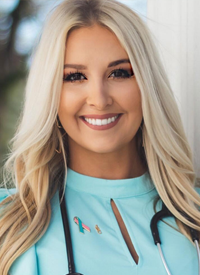Opinion: Nurses Need to Start Conversations About Genetic Testing
Liz-Hunter Brack, RN, discusses how oncology nurses can play an important role in patient education surrounding genetic testing.
Liz-Hunter Brack, RN

My childhood experiences with my mother and grandmother, my family history, and my own personal experiences drove me to become a nurse, and most importantly, an oncology nurse. My passion for genetic testing comes not only from my clinical background, but also my personal experience. My sister Copelan and I pursued genetic testing after watching our mother and grandmother battle breast cancer. We both tested positive for the BRCA2 genetic mutation, putting us at a significantly increased risk for developing breast cancer and ovarian cancer at a young age.
BRCA1 and BRCA2 genes produce proteins that repair damaged DNA—but when mutated, some variants increase the risk of developing cancer. After finding out we were carriers of this mutation, Copelan and I decided to act. She underwent a risk-reducing double mastectomy at 21 years old, and I did the same 3 years later when I turned 20 years old.
Among women, 60% to 80% of BRCA1 carriers and 50% to 70% of BRCA2 carriers will develop breast cancer in their lifetime. In men, this rate is 1% to 5% and 5% to 10% for BRCA1 and BRCA2, respectively. During my 2 years in oncology nursing, I have met many patients who, like me, tested positive for a BRCA variant. I try to share my story with patients, when appropriate, because it creates an immediate connection between us. From my perspective, this enhances the patient care experience and sparks their interest in learning more about genetic testing.
Some patients are unsure if they are candidates, and some—even if they have tested positive—are not always well-informed on the subject. I try to surface the subject, especially with patients who are BRCA positive with children, given that BRCA, often known as a “breast cancer gene,” can be passed down from either parent—it is not exclusive to female family members. I urge patients to familiarize themselves with their family history and, if they feel the need, to talk with their primary care physician about the possibilities of genetic testing. If a patient tests positive, I further encourage them to educate their children and grandchildren so they can take proper precautions and begin early surveillance of the breast and ovaries, and eventually have genetic testing done themselves. The hope is these preventive measures reduce their risk for cancer.
I feel incredibly fortunate I learned of this mutation at a young age and took the steps that were right for me, hopefully allowing our family to reduce the risk of cancer in future generations. I have served patients who were simply unaware of their genetic mutation and, if they had known sooner, may have been able to change course. This reality fuels my pursuit, as an oncology nurse, to spread awareness, knowledge and empowerment about genetic testing and help others take more control of their health.
During Breast Cancer Awareness Month and beyond, I encourage nurses to lean into conversation with patients about family history and genetic testing. As cornerstones of care and compassion, we may very well be the difference-makers in their journey.
Reference
Information for carriers of BRCA1 and BRCA2 gene mutations. Penn Medicine Abramson Cancer Center. Accessed October 20, 2022. https://bit.ly/3SizSP7



